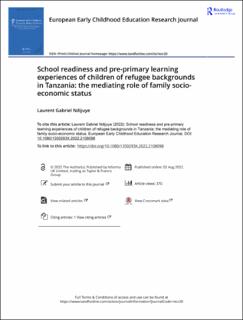School readiness and pre-primary learning experiences of children of refugee backgrounds in Tanzania: the mediating role of family socio-economic status
Peer reviewed, Journal article
Published version
Permanent lenke
https://hdl.handle.net/11250/3055040Utgivelsesdato
2022Metadata
Vis full innførselSamlinger
Originalversjon
Ndijuye, L. G. (2022). School readiness and pre-primary learning experiences of children of refugee backgrounds in Tanzania: the mediating role of family socio-economic status. European Early Childhood Education Research Journal, 1-16. 10.1080/1350293X.2022.2108098Sammendrag
School readiness of children from refugee backgrounds is not well documented throughout the sub-Saharan region. While evidence has documented the role of home learning environments on learning, little is known about the role of family socioeconomic status. The study recruited 400 pre-primary children, 100 parents, 16 teachers and 8 school principals from in-settlement areas and self-settled naturalised citizens, urban and rural majority groups in Tanzania. Data were collected by interviews, parents’ questionnaires and Bracken’s Basic Concept Scale-Receptive. Parental education, family assets, parental occupation and involvement were strongly related to children’s preparedness for school. However, while children of naturalised groups were from relatively poor families, their school preparedness was comparable to those from higher SES families. Parental beliefs and expectations played vital roles in influencing differences in children’s school readiness across groups. These findings broaden understanding of various factors that influence children’s learning in contexts with limited educational and family resources.

